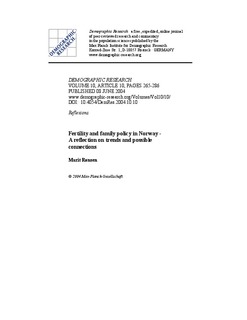Fertility and family policy in Norway : a reflection on trends and possible connections
Journal article, Peer reviewed
Permanent lenke
http://hdl.handle.net/11250/177678Utgivelsesdato
2004Metadata
Vis full innførselSamlinger
Originalversjon
Demographic Research, Vol. 10, Art. 10, 2004, pp. 263-286 http://dx.doi.org/10.4054/DemRes.2004.10.10Sammendrag
Below replacement fertility in many countries has lead to a renewed public interest in policies that may encourage young people to have more children. The Nordic countries are sometimes in focus in this respect, as their fertility rates remain relatively high in spite of very high female labour force participation. The key question is therefore whether there is a connection between generous public policies that facilitate childbearing and employment, and fertility. Using Norway as example and reviewing existing research evidence I conclude that generous family policies may be necessary, but not sufficient, to sustain fertility at a reasonable level. In particular, adverse macroeconomic conditions and rising unemployment have counteracting effects, as demonstrated by falling fertility rates in Sweden in the mid-1990s.
Beskrivelse
With permission from The Max Planck Institute for Demographic Research. The original publication is available at: http://dx.doi.org/10.4054/DemRes.2004.10.10
Artikkelen er tidligere publisert i Statistisk sentralbyrås Reprints nr 280.
